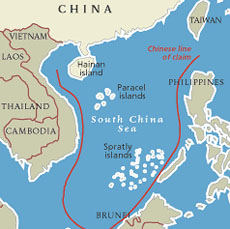Territorial Disputes in the South China Sea: What are the Risks of Conflict?

Practical information
This seminar is organized around Ralf Emmers, Associate Professor and Coordinator of the Multilateralism and Regionalism Programme, S. Rajaratnam School of International Studies (RSIS), Singapore. Among his latest publications are: Geopolitics and Maritime Territorial Disputes in East Asia, London: Routledge, 2009. (with Sam Bateman) (eds), Security and International Politics in the South China Sea: Towards a Co-operative Management Regime, London: Routledge, 2009.
Chair: Françoise Nicolas, Director, Center for Asian Studies Ifri.
The seminar will be held in English.
The presentation will focus on the changing distribution of power in the South China Sea and assess the implications this has for conflict management and avoidance in the disputed areas. There is a growing asymmetry of naval power in the South China Sea to the advantage of China. Southeast Asian claimants are concerned about the rapidly changing power distribution and fear that overwhelming naval capabilities could one day be used by the People's Republic of China to resolve the sovereignty question militarily. The presentation will therefore examine how the Southeast Asian nations have sought, with some success, to manage the unequal power distribution in the South China Sea through the activities of the Association of Southeast Asian Nations (ASEAN) and its model of conflict management and avoidance. It will assess the risks of conflict in the short to medium term and offer a way forward.
Speakers
Other events

EV Supply Chains for Japan and Europe: Strengthening Economic Security
Economic security aims to ensure the resilience of supply chains for key industries: the case of electric vehicle production in Japan and Europe will be discussed.

What Kind of Technological Partnership with India?
The 16th EU-India Summit, held on January 27th in New Delhi with European leaders António Costa, Ursula von der Leyen, and Prime Minister Narendra Modi, marks a significant milestone in deepening EU-India relations. At the same time, official bilateral visits from EU member states are on the rise, including that of the French President, who visited India in February to participate in the Artificial Intelligence Summit.






